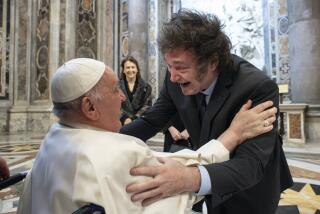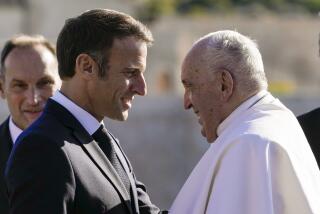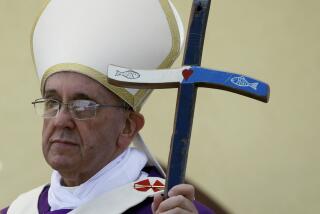Benedict Takes Traditional Family Message to Spain
- Share via
VALENCIA, Spain — Pope Benedict XVI embarked Saturday on the most contentious pilgrimage of his 15-month papacy, carrying his message of traditional family values to a country that has very diverse opinions on the matter.
Spain, with its socialist government, is one of the pope’s biggest challenges in what he sees as an increasingly secular, anti-religious West. Once a bastion of Roman Catholicism, Spain in the last year has legalized same-sex marriage and eased restrictions on divorce, abortion and other issues that the pope finds abhorrent.
Benedict is scheduled to spend just 26 hours in Spain to officiate at the conclusion of the fifth World Families Conference, and from the moment he stepped onto the tarmac at the airport in hot, steamy Valencia, he emphasized the importance of the traditional family.
“The family is a unique institution in God’s plan,” he said, adding that family “based on marriage” between a man and a woman cannot be substituted.
On the plane from Rome to Valencia, Benedict had reiterated his belief that same-sex marriage violates God’s law.
“We want to make people understand that according to human nature, it is man and woman who are made for each other and can give humanity a future,” he told reporters accompanying him on the flight.
Later, addressing hundreds of thousands of pilgrims camped out at a sprawling sports and art complex on the outskirts of Valencia, Spain’s third-largest city, he said the family was a “privileged setting” and an “indispensable foundation for society.”
“The family is an intermediate institution between individuals and society, and nothing can completely take its place,” he said. He admonished government leaders to “reflect” on the value of the traditional family and to work to protect it.
Tensions between the Vatican and the Spanish government were on view long before Benedict arrived. And several thousand Spaniards, including gays, atheists and liberal Catholics, were protesting the visit.
Spanish Prime Minister Jose Luis Rodriguez Zapatero met briefly with the pope but has indicated he will not be in attendance when Benedict says Mass today. That clearly irritated Vatican officials. Vatican spokesman Joaquin Navarro-Valls said pointedly that even hard-core leftists Fidel Castro of Cuba and Daniel Ortega of Nicaragua had attended papal Masses.
Crowds outside the residence of the archbishop of Valencia, where Benedict met Zapatero, booed the prime minister when he arrived. Journalists were not allowed to cover the meeting. Spanish officials described it as cordial; the Vatican did not comment. Television video showed the two men exchanging gifts.
Groups opposing the pope’s visit have been circulating petitions and staging demonstrations for several weeks but said they would not confront pilgrims while Benedict was in town. They hung posters reading “We Don’t Want You.” They said they oppose the church’s attempts to impose conservative values on their lives.
“I think the church is practicing a kind of fundamentalism,” said Emilio Menendez. A year ago this month, Menendez and his partner became the first gay men to wed under Spain’s law allowing same-sex marriage. Zapatero made a top priority of the law, which extends the rights of heterosexual marriages to same-sex unions, including the adoption of children. About 4,500 couples have married under the law, officials say.
The protesters were far outnumbered, however, by tens of thousands of pilgrims who came to Valencia from many parts of the world. They lined the streets to see Benedict’s motorcade pass, and buildings were festooned with banners in the Vatican colors of yellow and white.
“We are here because the family is being destroyed and we really need to get out the message that families need support,” said Rosa Fernandez, a resident of the Spanish city of Burgos who had come with her husband and three children.
This is the pope’s third trip outside Italy since his election in April 2005. On his previous journeys -- to his native Germany and to Poland, his predecessor’s homeland -- were on safe ground with friendly governments.
Spain, however, is a more hostile territory. The Roman Catholic Church enjoyed privileged status under the dictatorship of Gen. Francisco Franco and under the rightist government that Zapatero’s Socialist Party unseated two years ago. The country has undergone rapid modernization in recent years, abandoning many traditions and growing more secular.
Benedict was greeted at the airport by King Juan Carlos and Queen Sofia, who bowed slightly as they clasped his hand.
With police sharpshooters and NATO surveillance aircraft providing security, the pope traveled from the airport through the coastal city in his “popemobile.” He stopped at the Jesus Street train station, where 42 people were killed last week in a subway crash, to pray and lay a wreath.
Later, he consoled weeping relatives of the dead at the Basilica of the Virgin of the Helpless, and then met with Spanish bishops at Valencia’s 13th century cathedral. Benedict urged the bishops to continue their fight against rapid secularization in a country with “deep Christian roots.”
“Continue dauntlessly to proclaim that prescinding from God, acting as if he did not exist or relegating faith to the purely private sphere, undermines the truth about man and compromises the future of culture and society,” he said.
More to Read
Sign up for Essential California
The most important California stories and recommendations in your inbox every morning.
You may occasionally receive promotional content from the Los Angeles Times.











